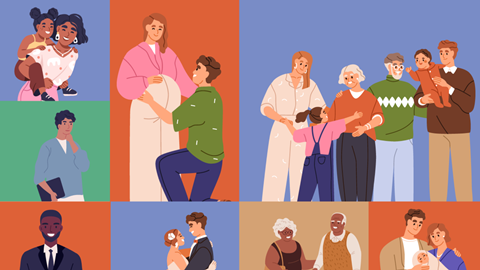Whether you’re a newlywed, empty-nester or busy building a business, God is with you in every stage of your life. Joe Warton explains how to make the most of right now
It’s half past two in the afternoon, and Vanessa sits in a wicker chair in her conservatory. A squirrel sizes up the birdfeeder while she finishes off her Earl Grey tea. “I guess this is OK,” she supposes to herself. No more early starts, no more deadlines, no more office politics. But she feels something or, perhaps more accurately, she doesn’t feel something. Bored? Kind of. Depressed? No, it’s not that. Flat? Yes, flat.
Vanessa used to work in publishing and academia. There was always a meeting to attend, a manuscript to review, a call to return…or avoid. Now she’s 68, and life’s…fine. She volunteers with her church, she keeps up with her sister and her nephews, she walks with a group on Tuesday mornings; she reads a lot. Many of her retired friends seem busier than her – especially the ones with grandkids nearby. She feels a bit unneeded, and it kind of hurts.
Now meet Joel and Maddy. A year ago, they were working full-time, leading a small group, climbing twice a week and started most days with reading their Bible (though Maddy’s penchant for oversleeping sometimes got in the way of that). Ah yes, the sleep! Oh, the sleep.
Three months ago, they welcomed baby Grace into their lives. Needless to say, the above paragraph no longer accurately describes their typical week.
God in every chapter
The stories of our lives contain many chapters. Some are exciting, some are dull. Some change gradually, some very suddenly. Some we choose and some we don’t.
In case you’re in a really busy season of life and don’t read beyond this paragraph, let me at least assure you of this: whatever stage of life you’re in right now, God is with you there. He will grow you there and he will work through you there.
The reality for many of us, though, is that we don’t view our current life stage through that lens.
Often, we find ourselves looking back. “It was so much easier to grow in my faith and feel purposeful when I had that job / before we had kids / when I was a student / when my health was better / [insert your idealised past here].”
Or we look forward to a golden future of kingdom-building, God-honouring, fruit-bearing discipleship: “It will be so much better when the kids are older / I get a job in a Christian organisation / I find a spouse / move to Devon [insert your idealised future here].”
But now, in the present? Let’s just get through the day, shall we?
If this resonates, you’re not alone. I feel you. This has been me, and I easily slip into it. So, in a spirit of being willing to be corrected, let’s listen carefully to these words of Dallas Willard: “We must accept the circumstances we constantly find ourselves in as the place of God’s kingdom and blessing. God has yet to bless anyone except where they actually are, and if we faithlessly discard situation after situation, moment after moment, as not being ‘right’, we will simply have no place to receive his kingdom into our life. For those situations and moments are our life.” (The Divine Conspiracy, HarperCollins).
When you responded to God’s call, he had at least some inkling of what your life would look like
I want to watch my tone here – most of us carry enough hurt and guilt as it is. But is it possible that our imagination for what it looks like to follow Jesus and grow as his disciples is somewhat limited?
Do we think if we’re in a season where half an hour of Bible reading every morning is unrealistic, we can’t grow? Or that if maintaining a 100 per cent attendance record on a Sunday morning is no longer doable, we’re somehow failing? Or if we find ourselves with too much to do, or in a job we don’t like or living in a retirement home, that all of a sudden, we’re somehow beyond God blessing us and working through us? Is God so limited that he needs us in one of life’s ‘Goldilocks zones’, where everything is just right, or the whole plan falls apart?
When you responded to God’s call to follow Jesus, he had at least some inkling of what your life would look like. He knew it wouldn’t all be the same. He knew you’d sometimes struggle. And he wasn’t fazed. He looks at you right now like he looked at Esther, the plaything of a pagan king, whom God saw as a liberator of people. He looks at you in the same way as the slaves in the first-century Roman world, who he said could point others to Jesus through their character and conduct (1 Peter 2:12,18-20). Like them, whatever stage of life you’re in, he’s with you, he’s able to grow you and he has purposeful stuff for you to do.
In this chapter of life, there are lessons you will learn, people you will connect with, ways you will rely on God and virtues you will develop. Don’t discard your situation; these moments are your life!
3 questions for every stage
Whether starting an apprenticeship, becoming an empty-nester, stepping into management or being forced into medical retirement – whatever stage, there are three big questions you might wrestle with.
The first is one of identity: who am I? This is a question everybody contends with – occasionally consciously. It can be particularly acute when we transition from one chapter of our story to the next. It can be fun and exhilarating: who am I now that I’ve just got married, or just gone freelance? Sometimes it’s incredibly painful: who am I now that I have this chronic illness and can no longer work? Who am I now my spouse of more than 50 years has passed away, and I am alone?
As Christians, when it comes to grappling with this deep and fundamental question of identity, we stand on solid ground in a pair of grippy trainers. We are “children of God” (1 John 3:1), citizens of his kingdom (Philippians 3:20) and bearers of his image (Genesis 1:26-27).
Whatever stage of life you’re in right now, God is with you there
I’m not saying: “You’re a child of God, get over it!” Rather, our God-given identity gives us the safety and assurance we need to explore who we are. And it sparks our imagination for what this season could be. If I’m a beloved child of God, what might it look like for me to live out that belovedness as I pick up my kids from school, or fly a Boeing 737? If I bear the image of God, what does that mean for me as I serve people coffee, or volunteer with the National Trust?
Potential answers to this are limitless. When picking up the kids, it might look like not climbing the social ladder by trying to get in with the cool parents, but rather taking time to connect with those on the margins. For the pilot, it might mean listening with more attentiveness to other members of the crew, or thanking God for his love before beginning a tricky landing. For the barista, it might mean working with your head held high, and making that caramel macchiato with a little extra pizzazz. And the National Trust volunteer can be mindful that they’re engaging in the kind of work God does in Genesis 1 and 2: bringing order, creating beauty and delivering joy and refreshment to others.
The second question is about purpose: what should I do? Sometimes we get to choose this; sometimes we have to play the cards we’re dealt.
When Steve and Roxi were gearing up for retirement, they had a pretty cool bucket list prepared, much of it involving foreign travel. But just as Steve was signing off, tragedy struck. Steve’s sister, who had three teenage children, and whose husband had passed away some years before, was diagnosed with aggressive, terminal cancer. It was a desperately sad situation. She didn’t live nearby, but the fact Steve and Roxi were no longer tied to work meant they had time and headspace to support Steve’s sister in her final months, and to be a practical and emotional support to her kids from then onwards. Steve and Roxi had lots of questions for God. They still do. In the midst of the questioning and the grief, God gave them something to do, and they responded. In ways they never asked for, they had a new purpose.
When we think about responding to God in each chapter, there’s a beautiful word we might not have thought applies to us: vocation. Vocation isn’t the preserve of 21-year-olds, nor is it limited to certain career paths, such as being a teacher or pastor. The word ‘vocation’ comes from the Latin vocare, meaning ‘to call’. The Bible makes it clear that all of us have a vocation; a calling from God. This calling has many elements; it’s not just about the job we do.
In 1 Corinthians 7:17, Paul explains that any situation we find ourselves in is, in fact, a calling from God. And in Romans 8:28-29, he describes how we are called “to be conformed to the likeness” of Jesus.
All of this means that, right now, God is calling you. He has specific things for you to do, and in the midst of doing that, he calls you to become a particular type of person: someone who increasingly reflects the character of Jesus.
This helps us when we’re tired of responding to our kids’ constant needs: this is a season where God is teaching us to be servants. It helps us when we’re involved in someone else’s personal care: God is teaching us patience and gentleness. It helps us when we get promoted: this is a time for us to learn about servant leadership and stewarding resources.
Then there’s the third question. Relationships: who am I connecting with in this stage?
Moving from one stage to the next often entails a loss of relationships. Maybe you get on great with your colleagues, but your leaving lunch is the last time you’ll have any contact with them. Or your kids move from primary to secondary school, and you’re no longer connecting with fellow parents in the playground at pick-up time.
You’re not going to keep all those relationships alive. But are there some that you hope will endure? If so, find ways to deepen and strengthen those connections beyond the shared activity that currently brings you together. Meet up for coffee. Invite them for dinner. Go to a rugby match or flower show together. Investing in friendships now means they are more likely to last when life changes.
Maybe there’s also something about accepting that God brings some people into your life for a limited time, and when life moves on, you won’t see them again. I recently spoke to a university student who, in the past year, has seen around 30 non-Christian students attend at least one service or event at his church as a result of his invitation. When he moves into the world of work, he probably won’t see many (or even any) of them again. But in the time that they’ve known him, they’ve encountered somebody who loves them, who’s pointed them to Jesus and who’s given them a chance to taste both the message and the community of the gospel.
You don’t have to bring 30 people to church (although wouldn’t that be great?), but who are you connecting with in this season? What role might you play in helping them in this stretch of life’s journey, and how might you show them Jesus?
Looking back, moving forward
Having just hit 40, I look back on the chapters of my own life so far: studying theology, dropping out due to health reasons, working with a homeless charity in Cape Town, South Africa, being a temporary security guard, having kids, changing churches, going freelance.
Along with King David, I can honestly say: “The Lord is my shepherd, I shall not…want…Surely goodness and love will follow me all the days of my life, and I will dwell in the house of the Lord forever” (Psalm 23). Seeing his faithfulness so far gives me hope for my present, and for the chapters to come. May you be able to say that too.






































No comments yet